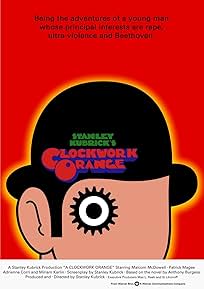
[...**The film is not guilty of human folly. The film is a reflection. A warning. That's what art is. It's not a manual of conduct. It's a catalyst for thought**...]

📽️ Greetings, film and TV series lovers at Hive. I'm back, happy to share with you a new review of my series **Ten Films That Shook the World.**
Today I'm featuring one of those films that you don't just see, you feel. You suffer. You debate. I'm talking about a film that, since its release, has generated a cultural earthquake, raising blisters and sparking discussions that still don't end today.
It's a film that doesn't ask for permission.
This is the unmistakable **"The Orange" Mechanics**.
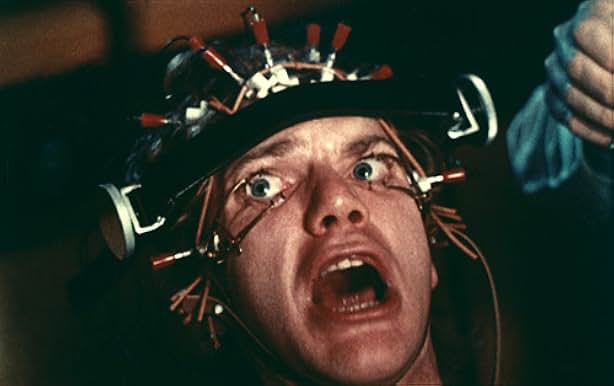
⏸️⏸️ INTRODUCTION ⏸️⏸️
My film review series "Ten Films That Shook the World," which I'm publishing on Hive, is dedicated to films that left their mark. Not just for their technical quality.
I'm talking about films that provoked something more. They provoked, well, a shudder. A discomfort. A deep reflection. A Clockwork Orange fits perfectly here.
It's a work that generated scandal. It was banned in several places. Its director, Stanley Kubrick, even pulled it from theaters. Few films have had such a divisive impact.
The basis of the film is the novel by Anthony Burgess. A complex book. A clear message. Burgess explored freedom. Morality. The control of the individual.
Kubrick took those ideas.
And brought them to a shocking visual and auditory level. He created a unique cinematic experience. A work that, decades later, remains relevant. Its violence is graphic. Its themes are universal. The film forces us to look inward.
To question what it means to be human.
What freedom is.
What good is.
What evil is.
It's an uncomfortable masterpiece. And therefore, essential.
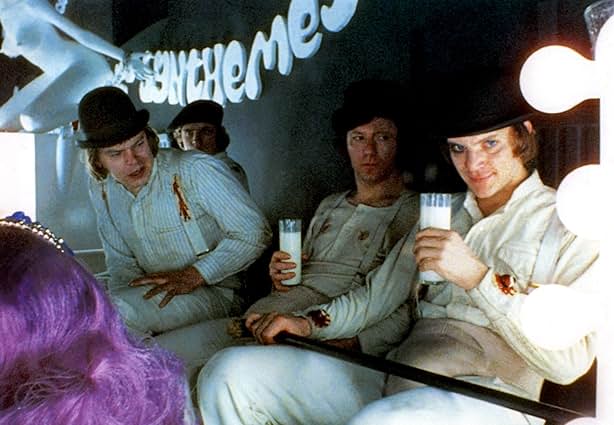
⏸️⏸️ CONTEXT ⏸️⏸️
The story takes place in a dystopian Britain. A near future. The streets are dominated by youth gangs. Social decay is palpable. There is no apparent law. Chaos is the norm.
The protagonist is Alex DeLarge, a charismatic young man, a born leader. He is part of a group of "druggies." They use a particular slang. They call it Nadsat. It's a Russian language and youth slang. It makes everything more disturbing.
The nights of this group are ritualistic. They dress in white clothes. They wear bowler hats. Their activities are aberrant. They engage in "ultraviolence." They attack innocent people. They steal. They rape. There is no remorse. Alex enjoys it. His pleasure is evident. Violence is his hobby, his drug. Classical music accompanies him. Beethoven is his favorite. His favorite music plays in his head. It's a soundtrack to his crimes.
The irony is brutal.
One night, a gang member rebels, but Alex subdues him. Then, he betrays them. They attack him by surprise. They leave him at the mercy of the police, and Alex is captured. He is tried. He is convicted of murder. He goes to jail. Jail is a sordid place. Prison life is hard. Alex adapts. He looks for a way out.
The government has a new plan. An experiment. It's called the Ludovico Technique. It promises to rehabilitate criminals. To take away their free will. To turn them into exemplary citizens. Alex volunteers. He wants out of jail. He doesn't know the consequences.
The treatment is shocking. Alex is tied up. His eyes are covered. He is forced to watch movies. They are images of extreme violence. Of sex. Of death. All this while they administer drugs. These drugs make him nauseous. An uncontrollable disgust. He associates violence with physical discomfort. He also associates his beloved classical music. Beethoven now repulses him.
The experiment works. Or so it seems. Alex can no longer be violent. It causes him unbearable pain. He can't defend himself. He can't attack. He can't enjoy music. He's an automaton. A nullified being. The government releases him. He presents him as a success.
But life outside prison is cruel. His parents kick him out. His house has been occupied. He finds a homeless man. The same one Alex beat up earlier. The homeless man recognizes him. He attacks him. Then his old gang shows up. They're now police. They recognize him. They torture him. They take him to the outskirts. They humiliate him. They beat him.
Alex seeks refuge. He arrives at the home of a writer. The same writer his gang attacked years before. His wife was raped. The writer doesn't recognize him. He offers him help. He gives him food. He gives him shelter. But the writer is a political activist. He uses Alex as a symbol. A weapon against the government. He manipulates him.
The writer discovers Alex's identity. He takes revenge. He locks him in a room. He subjects him to loud music. Classical music. The music he now hates. It pushes him to the limit. Alex attempts suicide. He jumps out the window.
He survives. He's in the hospital. The government intervenes. It's a scandal. They need to clean up their image. They "fix" him. They take away the effects of the treatment. Alex is back to his old self. His mind is free. The last scene is ambiguous. It suggests a cycle. The violence persists. Alex enjoys it again. The ending is chilling. It leaves us thinking.
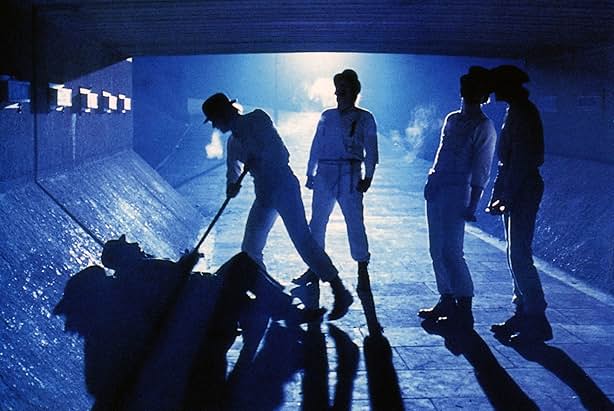
⏸️⏸️ MY OPINION ⏸️⏸️
When I saw **A Clockwork Orange** for the first time, I felt a shock. A visceral impact. It's one of those films that grabs you. It disturbs you. You can't escape. It's Kubrick's genius. He took a powerful novel. He turned it into an unforgettable cinematic experience. His vision is unique. His aesthetic is distinctive.
Kubrick's direction is pinpoint. Every frame is precise. Symmetry is key. The colors are striking. The sets are futuristic. But also decadent. The music is crucial. He uses Beethoven. He mixes it with synthesizers. It creates a brutal contrast. Classical beauty with the ugliness of violence. This unsettles you. It makes you uncomfortable. It forces you to think.
For me, the heart of the film is free will. It's the central question. Is it better to be good out of obligation? Or to be evil by choice? The Ludovico treatment is the key. It turns Alex into a harmless being. But it takes away his essence. It makes him a slave. He's not moral. He's not human. He's a robot. This makes me wonder. Society seeks control. It seeks order. At what price? Can we sacrifice individual freedom? For me, the answer is no.
The film explores the nature of violence. Kubrick doesn't glamorize it. He exposes it. He shows it raw. At times, almost choreographed. This makes your stomach turn. But it doesn't invite you to imitate it. It invites you to reflect. To feel repulsion. Many have accused it of inciting violence. I think that's a superficial reading. The film reflects human brutality. No one is left indifferent.
Actor Malcolm McDowell plays Alex. His work is iconic. His cynical smile is unforgettable. He's charismatic. He's terrifying. He makes us feel for him, even when he's monstrous. Then, when he's a victim, we feel pity. This duality is brilliant. He's an actor who gave his all. His gaze penetrates our soul in a terrifying way. He's one of cinema's great characters.
The use of music is a lesson in cinema. Beethoven is just another character. Of course he is. His Ninth Symphony is the soundtrack to "ultraviolence." Then, it's the source of Alex's torment. The music twists. It goes from pleasure to pain. This contrast is masterful. The music elevates the scenes. It gives them an operatic feel. It makes them unforgettable.
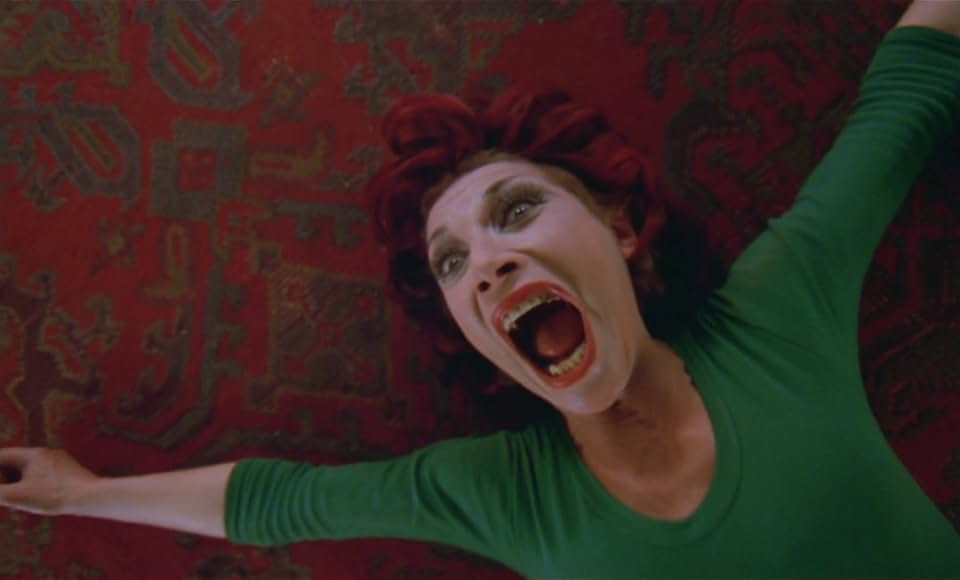
The controversy surrounding the film was enormous. There were imitations. There were reported acts of violence. Kubrick withdrew it from the UK. It was his decision. To protect his family. But the film is not guilty of human folly. The film is a reflection. A warning. That's what art is. It's not a manual of conduct. It's a catalyst for thought.
Its relevance today is undeniable. Manipulation. Government control. Imposed morality. The pursuit of order at any price. These are very current issues. Social media. Polarization. Cancellation. All of this leads us to question freedom. Our own capacity for choice. The film is timeless. Its message is universal.
I've always felt that "A Clockwork Orange" is a cinematic experiment. Kubrick plays with us. Pushes us to the limit. He doesn't give us easy answers. He leaves us with uncomfortable questions.
How easy is it to give away our freedom?
How dangerous is coercion?
The end is a circle. It suggests that violence is part of human nature. It can't be eradicated. It can only be suppressed. And suppressing it comes at a cost.
The film has brought me back to it many times. Each time I discover something new. A nuance. A detail in the wardrobe. An expression on McDowell's face. It's a dense work. Full of layers. It's one of those that stays with you. It haunts your thoughts. It forces you to debate with yourself. It's a test. A test of your own morality.
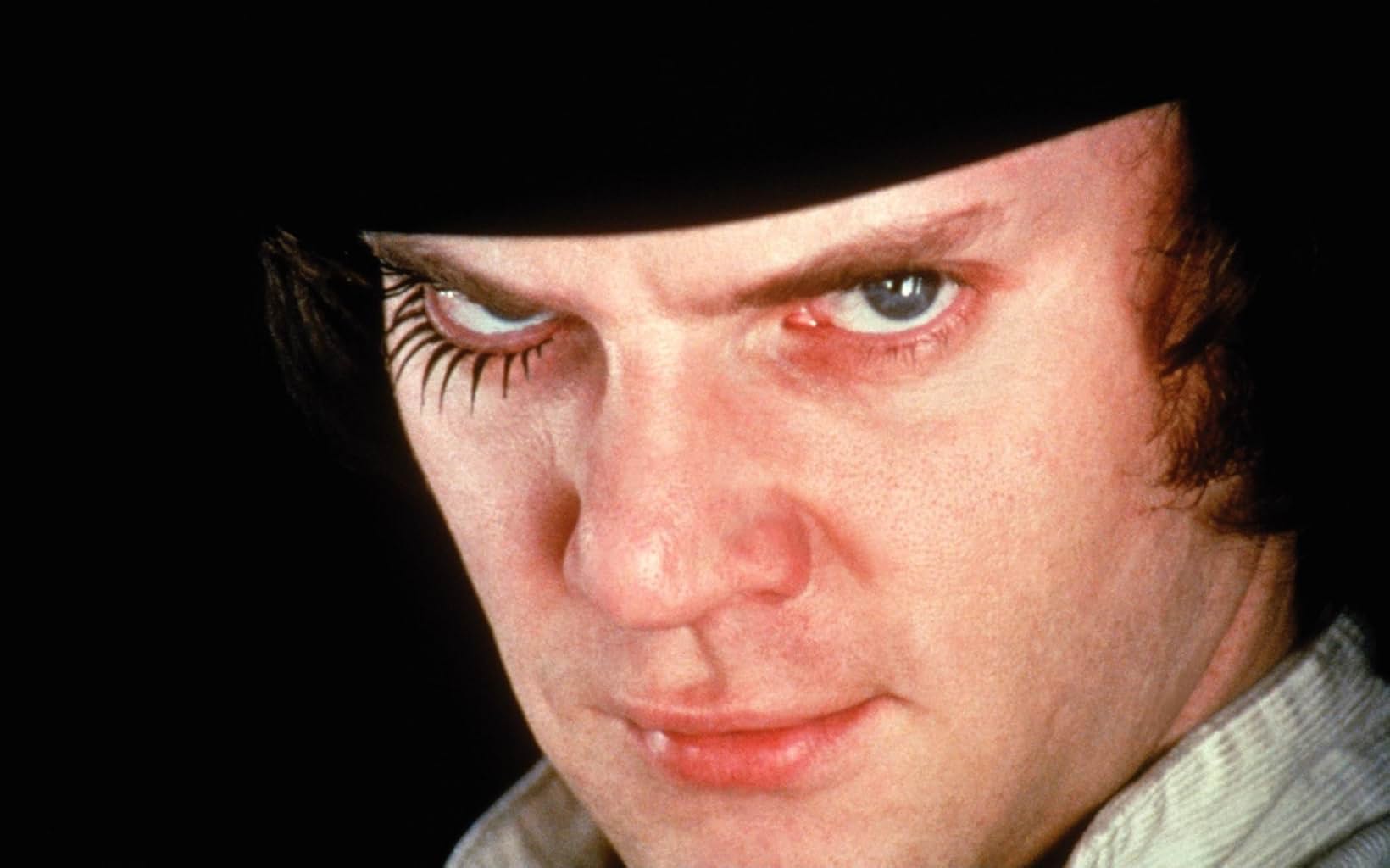
⏸️⏸️ CONCLUSION ⏸️⏸️
It's not a film for everyone. I know. It's tough. It's provocative. But it's a masterpiece of cinema. It's one of those films that had to be on this list. One of "Ten Films That Shook the World." It did so then. It continues to do so today. It forces us to face uncomfortable truths.
It's a film that forces us to question society. Freedom. Violence. The human capacity to choose. Or to be manipulated. Kubrick gave us a brutal work. A dark gem. A monument to auteur cinema.
My experience with it has always been intense. And I think it's that way for anyone who dares to see it. It won't leave you indifferent. It will make you think. And that, for me, is the greatest achievement of any film. I leave it here for you, for you to discover. Or to revisit. But with an open mind. And a prepared heart.
🎯 **Aquí puedes leer las reseñas que he publicado de la saga "Diez películas que estremecieron al mundo."**
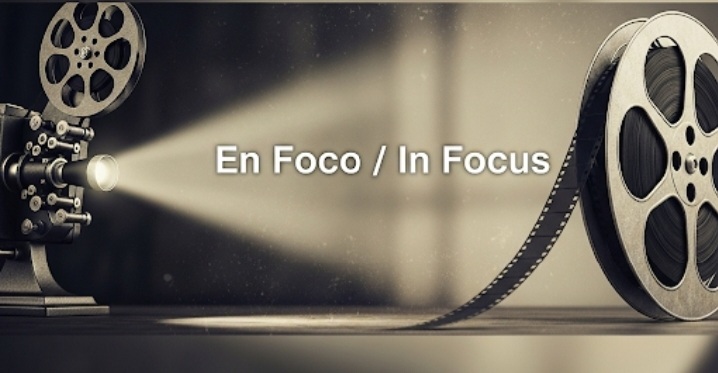
https://peakd.com/hive-121744/@marabuzal/is-there-such-a-thing
https://peakd.com/hive-121744/@marabuzal/gone-with-the-windorlo-que-el-viento-se-llevo-eng-esp
https://peakd.com/hive-121744/@marabuzal/diez-peliculas-que-estremecieron-al-mundo-metropolis
https://peakd.com/hive-121744/@marabuzal/ten-films-that-shook-the
https://ecency.com/hive-166847/@marabuzal/review-of-la-dolce-vita-eng-esp


[...**la película no es culpable de la locura humana. La película es un reflejo. Una advertencia. El arte es eso. No es un manual de conducta. Es un catalizador de pensamiento**...]

### La naranja mecánica
📽️ Reciban un saludo cordial, amantes del cine y las series de TV en Hive. Regreso, feliz de compartirles una nueva reseña de mi ciclo **Diez películas que estremecieron al mundo.**
Hoy les propongo una de esas cintas que no solo se ven, se sienten. Se sufren. Se debaten. Te hablo de una película que, desde su estreno, generó un terremoto cultural, levantando ampollas y desatando discusiones que aún hoy no terminan.
Es un filme que no pide permiso.
Se trata de la inconfundible **"La Naranja Mecánica**.

⏸️⏸️ INTRODUCCIÓN ⏸️⏸️
Mi ciclo de reseñas cinematográficas "Diez películas que estremecieron al mundo" que estoy publicando en Hive está dedicado a filmes que dejaron huella. No solo por su calidad técnica.
Hablo de películas que provocaron algo más. Provocaron, eso, un estremecimiento. Una incomodidad. Una reflexión profunda. La Naranja Mecánica encaja perfectamente aquí.
Es una obra que generó escándalo. Fue prohibida en varios lugares. Su director, Stanley Kubrick, llegó a retirarla de cartelera. Pocas películas han tenido un impacto tan divisivo.
La base de la película es la novela de Anthony Burgess. Un libro complejo. Un mensaje claro. Burgess exploró la libertad. La moral. El control del individuo.
Kubrick tomó esas ideas.
Y las llevó a un nivel visual y auditivo impactante. Creó una experiencia cinematográfica única. Una obra que, décadas después, sigue siendo relevante. Su violencia es gráfica. Sus temas son universales. La película nos fuerza a mirar hacia adentro.
A cuestionar qué significa ser humano.
Qué es la libertad.
Qué es el bien.
Qué es el mal.
Es una obra maestra incómoda. Y por eso, esencial.

⏸️⏸️ CONTEXTO ⏸️⏸️
La historia nos sitúa en una Gran Bretaña distópica. Un futuro cercano. Las calles están dominadas por bandas juveniles. La decadencia social es palpable. No hay ley aparente. El caos es la norma.
El protagonista es Alex DeLarge, un joven carismático, líder nato. Forma parte de un grupo de "drugos". Usan un argot particular. Lo llaman Nadsat. Es un lenguaje ruso y slang juvenil. Lo hace todo más inquietante.
Las noches de este grupo son rituales. Se visten con ropa blanca. Llevan sombreros bombín. Sus actividades son aberrantes. Se dedican a la "ultraviolencia". Agreden a inocentes. Roban. Violan. No hay remordimiento. Alex disfruta de ello. Su placer es evidente. La violencia es su pasatiempo. Su droga. La música clásica lo acompaña. Beethoven es su favorito. Su música preferida suena en su cabeza. Es una banda sonora para sus crímenes.
La ironía es brutal.
Una noche, un miembro de la banda se rebela pero Alex lo somete. Luego, los traiciona. Lo atacan por sorpresa. Lo dejan a merced de la policía y Alex es capturado. Es juzgado. Se le condena por asesinato. Va a la cárcel. La cárcel es un lugar sórdido. La vida en prisión es dura. Alex se adapta. Busca una salida.
El gobierno tiene un nuevo plan. Un experimento. Se llama la Técnica Ludovico. Promete rehabilitar a los criminales. Quitarles el libre albedrío. Convertirlos en ciudadanos ejemplares. Alex se ofrece como voluntario. Quiere salir de la cárcel. No sabe las consecuencias.
El tratamiento es chocante. A Alex lo atan. Le sujetan los ojos. Lo obligan a ver películas. Son imágenes de violencia extrema. De sexo. De muerte. Todo esto mientras le administran drogas. Estas drogas le provocan náuseas. Un asco incontrolable. Asocia la violencia con el malestar físico. También asocia su amada música clásica. Beethoven ahora le produce repulsión.
El experimento funciona. O eso parece. Alex ya no puede ser violento. Le provoca un dolor insoportable. No puede defenderse. No puede atacar. No puede disfrutar de la música. Es un autómata. Un ser anulado. El gobierno lo libera. Lo presenta como un éxito.
Pero la vida fuera de prisión es cruel. Sus padres lo echan. Su casa ha sido ocupada. Encuentra a un vagabundo. El mismo que Alex golpeó antes. El vagabundo lo reconoce. Lo ataca. Luego, aparece su antigua banda. Son ahora policías. Lo reconocen. Lo torturan. Lo llevan a las afueras. Lo humillan. Lo golpean.
Alex busca refugio. Llega a la casa de un escritor. El mismo escritor que su pandilla atacó años atrás. Su esposa fue violada. El escritor no lo reconoce. Le ofrece ayuda. Le da comida. Le da cobijo. Pero el escritor es un activista político. Usa a Alex como un símbolo. Un arma contra el gobierno. Lo manipula.
El escritor descubre la identidad de Alex. Se venga. Lo encierra en una habitación. Lo somete a música a todo volumen. Música clásica. La música que ahora odia. Lo empuja al límite. Alex intenta suicidarse. Salta por la ventana.
Sobrevive. Está en el hospital. El gobierno interviene. Es un escándalo. Necesitan limpiar su imagen. Lo "reparan". Le quitan los efectos del tratamiento. Alex vuelve a ser el mismo. Su mente está libre. La última escena es ambigua. Sugiere un ciclo. La violencia persiste. Alex vuelve a disfrutarla. El final es escalofriante. Nos deja pensando.

⏸️⏸️ MI OPINIÓN ⏸️⏸️
Cuando vi **La Naranja Mecánica** por primera vez, sentí un golpe. Un impacto visceral. Es una de esas películas que te atrapa. Te perturba. No puedes escapar. Es el genio de Kubrick. Él tomó una novela fuerte. La convirtió en una experiencia cinematográfica inolvidable. Su v